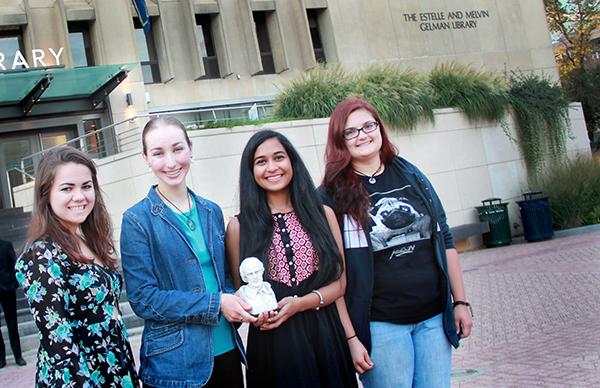Most days, the Globe Theater in London stands empty. But last spring, the 415-year-old wooden stage was buzzing with GW students, scripts in their hands, as they recited some of Shakespeare’s most famous lines.
Three years after an overhaul that led to the launch of a study abroad trip, the Dean’s Scholars in Shakespeare program is thriving despite a nearly 25 percent drop in the number of English majors since 2009, according to the Office of Institutional Research and Planning.
Alexa Huang, the director of the program, said part of the reason it continues to evolve is because students from all majors and fields are members.
“Shakespeare is an umbrella that covers so many topics in and out of the humanities,” Huang said.
Before Huang relaunched the program in 2012, it was led by theater professor Alan Wade. The former version, which started in 2006, was a one-year, four-course intensive program.
When she took over, Huang wanted to turn the program into a more collaborative experience that utilized D.C.’s literary resources, like the Folger Shakespeare Library and the Shakespeare theater companies across the city.
And even while she’s on sabbatical, Huang’s revamped curriculum has continued to draw applicants.
The two-year-long program, part of the Columbian College of Arts and Sciences, accepts 15 students every year. It boasts about 60 students total.
“Shakespeare is all about how we became modern and we wanted to work with students who really wanted to dig deeper into Shakespeare. We wanted to give GW a special student experience,” Huang said.
She said a new living-learning cohort boosts the program’s community feel. Freshmen in the program live together in a residence hall on the Mount Vernon Campus and take three required classes together, including a special University Writing course.
In their sophomore year, students travel to London over spring break. The trip – which is free, aside from airfare – became a part of GW’s existing “Shakespearean England” course in spring 2013 as was a way for the University to “invest in its most motivated students,” Huang said. The trip is open to any student enrolled in the course and not only students in the dean’s scholars program.
In London, students participate in workshops at the Globe Theater on the banks of the River Thames and see plays across town. Research opportunities also shape the trip’s agenda, with students using resources like the Stratford archives to work on their final presentations while abroad.
“We got to experience what scholars get to do in our sophomore year, and that’s just indescribable,” said junior Katherine Bradshaw, an English and classical Studies double major who was awarded a Luther Rice Undergraduate Research Fellowship for her work.
The fellowship, a GW-sponsored research grant that pairs students with a faculty mentor, allows students to do research for extended periods of time in the hopes that their work will be published in a scholarly journal. Bradshaw used the grant to continue her research in London last summer.
“The program is all about finding something the students like in Shakespeare, something that resonates with them,” said associate professor Holly Dugan, the interim director of the program while Huang is on sabbatical.
When Dugan took the helm, she wanted to encourage mentorship between new and old students in the program. Starting this year, she is pairing alumni of the program with freshman members.
She also plans to find ways to work with other living-learning cohorts on campus, like partnering with the politics and values group for a special screening of “Richard III,” to strengthen the program’s interdisciplinary focus.
“It proves that Shakespeare is anything but dusty and irrelevant,” Dugan said.







